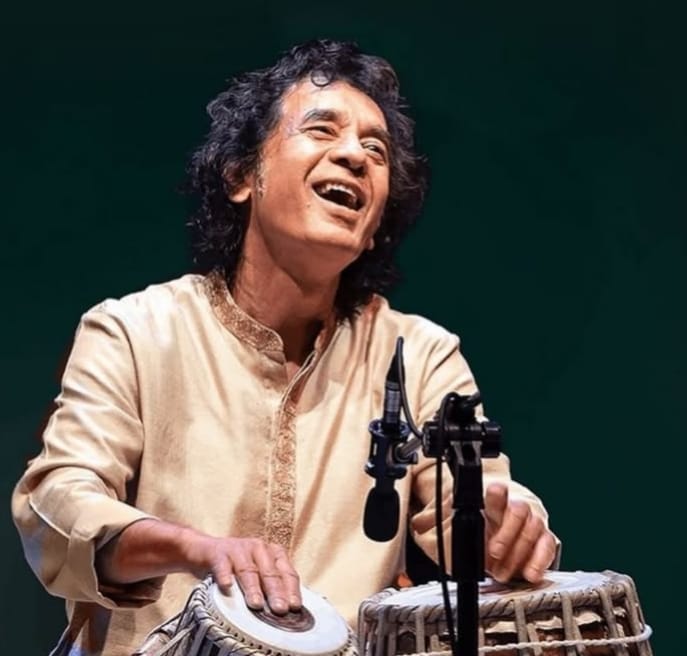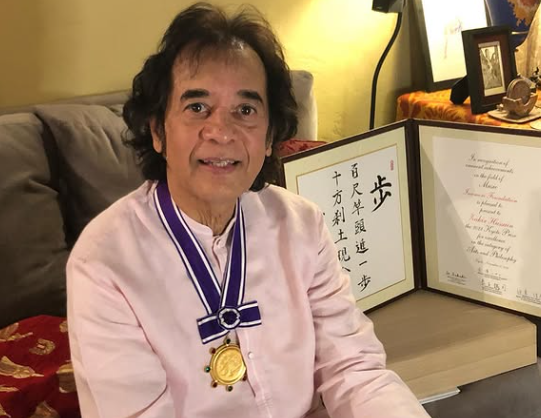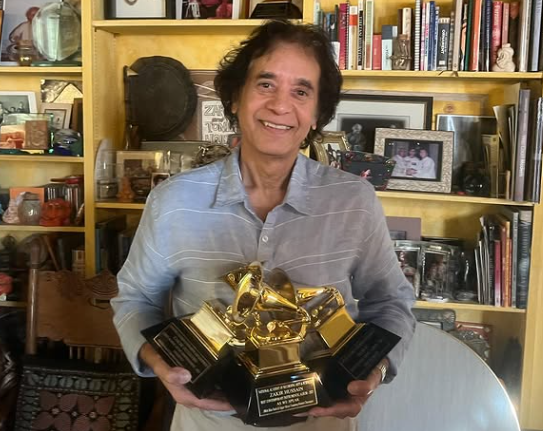Tabla maestro Zakir Hussain died at a hospital in San Francisco, USA, his family said on Monday. Hussain died due to complications arising out of idiopathic pulmonary fibrosis, the family said in a statement. He was 73.

He had been hospitalised for the last two weeks and was later taken to the ICU after his condition deteriorated.
Soon after the news of his death broke late on Sunday night (in India), and condolences were expressed by many, his close family members refuted the reports, and said that the iconic Indian classical percussion artiste was “very critical” but still alive, before eventually confirming Hussain’s demise.
Hussain, who is regarded as the greatest tabla player of his generation, is survived by his wife, Antonia Minnecola; his daughters, Anisa Qureshi (her husband, Taylor Phillips, and their daughter, Zara) and Isabella Qureshi; his brothers, Taufiq Qureshi and Fazal Qureshi; and his sister, Khurshid Aulia. Born on March 9, 1951, he is the son of legendary tabla master Ustad Alla Rakha.
“He leaves behind an extraordinary legacy cherished by countless music lovers around the globe, with an influence that will resonate for generations to come,” the statement read.

In his career spanning six decades, the musician worked with several renowned international and Indian artistes, but it was his 1973 musical project with English guitarist John McLaughlin, violinist L Shankar, and percussionist TH ‘Vikku’ Vinayakram that brought together Indian classical and elements of jazz in a fusion hitherto unknown.
Starting early at the age of seven, he went on to collaborate with virtually all of India’s iconic performers, including Ravi Shankar, Ali Akbar Khan and Shivkumar Sharma in his career.
A young Zakir Hussain fills in as the great Ali Akbar Khan replaces a broken string on his Sarod and tunes it. pic.twitter.com/jbwG0NcTaW
— Aunindyo Chakravarty (@Aunindyo2023) December 15, 2024
His groundbreaking work with Western musicians such as Yo-Yo Ma, Charles Lloyd, Béla Fleck, Edgar Meyer, Mickey Hart, and George Harrison brought Indian classical music to an international audience, cementing his status as a global cultural ambassador.
Hussain has received four Grammy Awards in his career, including three at the 66th Grammy Awards earlier this year.

The percussionist, one of India’s most celebrated classical musicians, received the Padma Shri in 1988, the Padma Bhushan in 2002, and the Padma Vibhushan in 2023.
this tabla x boxing jugalbandi in Monkey man was just pure genius.
— ح (@hmmbly) December 15, 2024
Even at 73 years of age he was hitting it out of the park, he lived his artform till his last breath. Rest in peace legend #zakirhussain pic.twitter.com/82H2ixXpnw
Condolences
Messages of condolence poured in on social media as the news of Hussain’s demise spread.
Deeply saddened by the passing of the legendary tabla maestro, Ustad Zakir Hussain Ji. He will be remembered as a true genius who revolutionized the world of Indian classical music. He also brought the tabla to the global stage, captivating millions with his unparalleled rhythm.…
— Narendra Modi (@narendramodi) December 16, 2024
Zakir Bhai ! He left too soon. Yet we are grateful for the times he gave us and what he left behind in the form of his art.
— Kamal Haasan (@ikamalhaasan) December 16, 2024
Goodbye and Thank you.#ZakirHussain pic.twitter.com/ln1cmID5LV
The rhythm of India paused today…
— anand mahindra (@anandmahindra) December 15, 2024
In tribute.
🙏🏽🙏🏽🙏🏽#ZakirHussain
pic.twitter.com/eknPqw4uKM
Grammy winner musician Ricky Kej remembered Hussain for his “immense humility, approachable nature”.
“One of the greatest musicians and personalities India has ever produced. Along with being the best himself, Zakirji was known for…being responsible for the careers of numerous musicians, who are now forces to reckon with themselves. He was a treasure trove of skill and knowledge and always shared and encouraged the entire music community through collaborations and his actions. His legacy will live on forever, and his influence will be felt for generations. He left us too soon,” Kej wrote on X.
American drummer Nate Smith thanked Hussain for “all of the music you gave us”.
Rhythms for prayers from dad Alla Rakha
Eight years ago, tabla maestro Zakir Hussain had narrated how his father Alla Rakha had welcomed him into this world by putting the musical instrument’s rhythms into his ears when asked to recite prayers.
Hussain spoke of his father holding him in his arms for the first time. Alla Rakha was an accomplished tabla player and a frequent accompanist of iconic sitar player Pandit Ravi Shankar.
“I was brought home and handed over to my dad in his arms. The tradition was that the father is supposed to recite a prayer in the baby’s ear, welcoming the baby and putting some good words,” he said.
“I am worshipper of Ma Saraswati”#zakirhussain
— Kreately.in (@KreatelyMedia) December 15, 2024
pic.twitter.com/78g9wAf3Qw
“So he takes me in his arms, puts his lips to my ear and recites the tabla rhythms into my ears. My mother was livid. She said, what are you doing? You’re supposed to say, you know, prayers, not rhythms.
“And he said, but these are my prayers. This is how I pray. He said, I am the worshipper of Goddess Saraswati and Lord Ganesh. This was a devout Muslim talking. He said this is the knowledge he got from his teachers and wanted to pass it on to his son,” Zakir Hussain said.
Most valuable five rupees
During his early days, he used to travel by train and if he could not find a seat, he would spread newspapers on the floor and sleep. During such journeys, so that no one’s feet touched his tabla, he used to sleep with the musical instruments in his lap.
In another interview, Zakir Hussain had recalled an incident when he was 12 years old. He had gone to a concert with his father. Music stalwarts like Pandit Ravi Shankar, Ustad Ali Akbar Khan, Bismillah Khan, Pandit Shanta Prasad and Pandit Kishan Maharaj were also present at that concert.
Zakir Hussain went on stage with his father and got five rupees for the performance. “I have earned a lot of money in my life, but those five rupees were the most valuable,” the tabla maestro had said.


